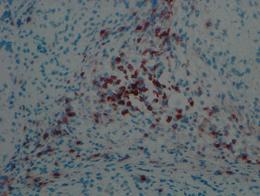Reprogrammed cells trigger immune reactions in mice
Medical applications of induced pluripotent stem cells called into question.
 An infiltration of T cells, shown by dark brown color, can be seen in the tissues formed by induced pluripotent stem cells.Yang Xu, UC San Diego
An infiltration of T cells, shown by dark brown color, can be seen in the tissues formed by induced pluripotent stem cells.Yang Xu, UC San DiegoCells that have been reprogrammed to grow into different types of tissue might be rejected by the body — even when they are transplanted into the individual from whom they are made, researchers report in a study published today in Nature1.
The study was led by Yang Xu, a molecular biologist at the University of California, San Diego. It will shake up the regenerative-medicine field, because until now, most scientists have assumed that reprogrammed cells made from an individual's own tissue could be safely transplanted back into the same person.
"This is a surprise; it's going to put a spanner in the works for the whole field," says Paul Fairchild, an immunologist and stem-cell biologist at the University of Oxford, UK.
The latest study looked at mouse embryonic stem cells and mouse induced pluripotent stem (iPS) cells. Both types of cell are pluripotent, meaning that they can grow into many other cell varieties.
Potential for change
Xu's team transplanted the cells into mice with the same genetic make-up as those that had donated the source cells. This mimics transplantation of cells from one human individual back into the same individual.
When transplanted, the embryonic stem cells gave rise to teratomas — tumours containing a chaotic jumble of cell types, which are used as a signifier of a cell's pluripotency. Most of the iPS cells, by contrast, were not able to form teratomas, or made teratomas that were attacked or rejected by the immune systems of the host mice.
"We expected that iPS cells generated from patients would be able to be transplanted back into patients," says Nissim Benvenisty, a stem-cell biologist at the Hebrew University of Jerusalem. "This paper indicates that that may not be the case."
The team found that certain genes were expressed at much higher levels in the teratomas formed by iPS cells than in those formed by embryonic stem cells. Two of the genes — Zg16 and Hormad1 — were specifically targeted in immune attacks. Xu suggests that these genes are normally turned off by the time a fetus begins the process of developing immune tolerance to its own tissues, so they are not recognized as 'self' by the host's body; the iPS reprogramming procedure might alter the normal expression of these genes.
Facing rejection
But Xu's study is not necessarily the dire news for the iPS field that it might seem.
Researchers working with iPS-derived cells that have matured to an adult fate — for instance, neurons or heart cells — have been able to transplant them into mice without rejection, but these experiments have mostly looked at mice without functional immune systems. And scientists designing therapies are mostly proposing to transplant only one type of differentiated cell at a time made from patients' own skin cells back into their bodies, rather than the jumble of differentiated cells found in a teratoma.
Xu and other researchers don't yet know whether purified differentiated iPS-derived cells would be rejected, or whether the problem is specific to undifferentiated cells.
Xu's study "doesn't really mirror the clinical situation at all", says Fairchild.
Fairchild points out that the iPS cells in Xu's study were derived from embryonic skin cells, rather than from adult skin cells, as would be the case for human patients. Perhaps these immature skin cells are more likely than adult cells to trigger an immune reaction. And he adds that it is not clear which cells in the teratomas triggered the immune rejection, or whether human cells would behave in the same way. Until these questions are resolved, Fairchild says, Xu's paper "might cast a shadow over the whole field of regenerative medicine unnecessarily".
Joseph Wu, a transplant biologist at Stanford University in Palo Alto, California, agrees that the paper "may trigger additional regulatory concerns" for iPS-cell derived patient-specific transplants.
The finding comes on top of the publication of a spate of studies suggesting that iPS cells might contain more genetic abnormalities than embryonic stem cells2. The US Food and Drug Administration heard concerns about genetic mutations in iPS cells at a meeting in Bethesda, Maryland, in March.
Fine-tuned therapies
Wu does not think that companies would be interested in developing patient-specific iPS-derived therapies. They are more likely to focus on cell-derived therapies that can be used in many people, which would require suppression of the immune system anyway.
"The overall significance of the finding is that more research [needs] to be done to examine whether iPS cells are immunoprivileged or not," says Wu.
Xu agrees. His group's next steps will be to examine which specific cells in the teratomas trigger immune rejection, and under what conditions. The team used two different methods to make the iPS cells, and they showed slightly different propensities to trigger immune rejection, so it may be that reprogramming methods can be fine-tuned to avoid the problem altogether.
"We propose that the technology to generate iPS cells needs to be improved in order to minimize the difference between iPS and embryonic stem cells, so that iPS cells can be more useful in human therapies," says Xu.
References
- , , & Naturedoi:10.1038/nature10135 (2011).
- Nature 471, 46-47 (2011).

Nenhum comentário :
Postar um comentário